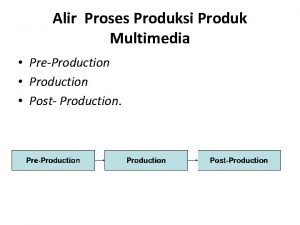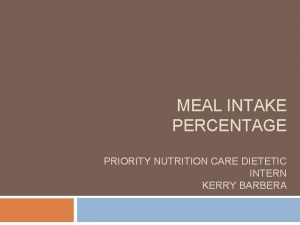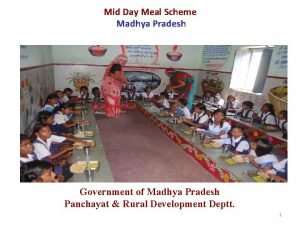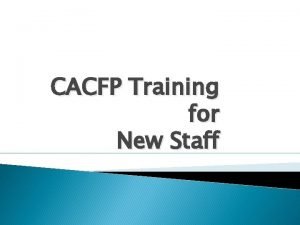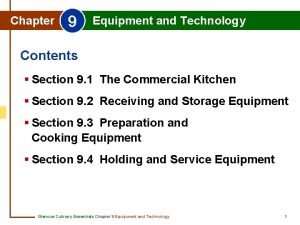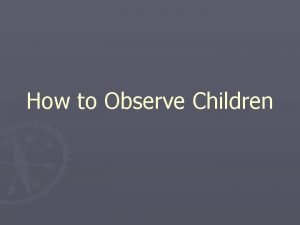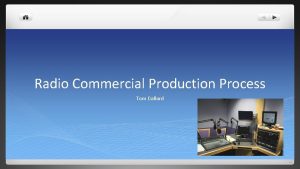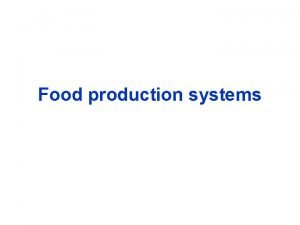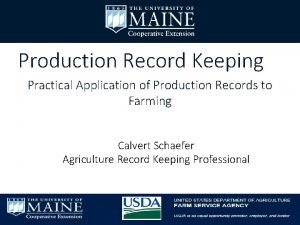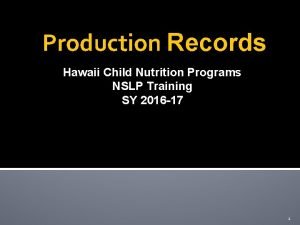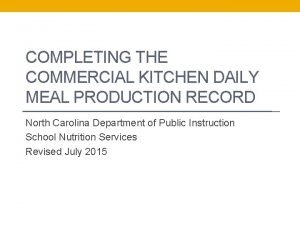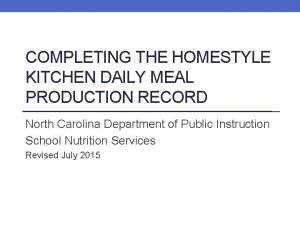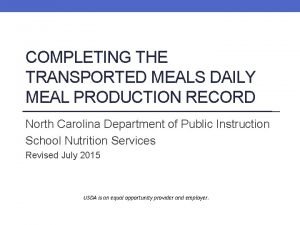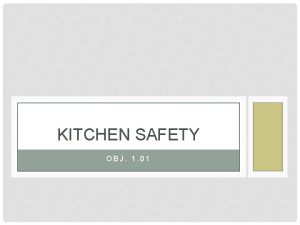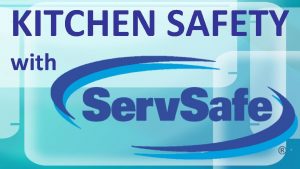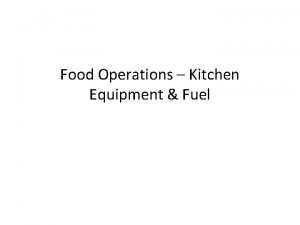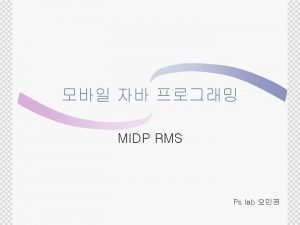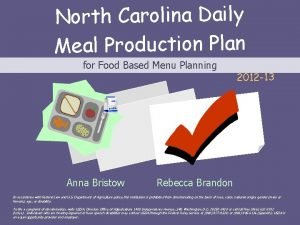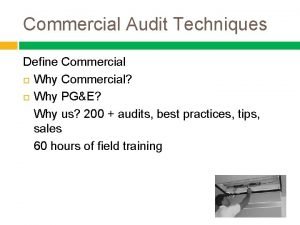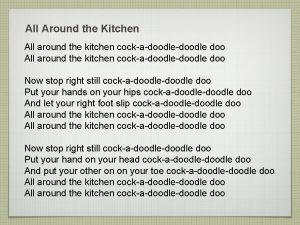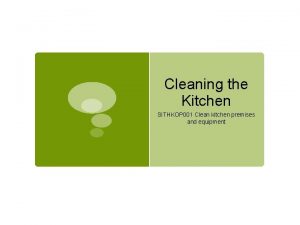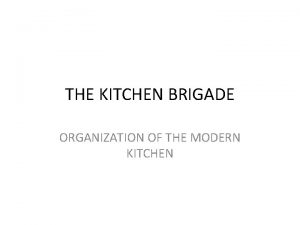COMPLETING THE COMMERCIAL KITCHEN DAILY MEAL PRODUCTION RECORD














































- Slides: 46

COMPLETING THE COMMERCIAL KITCHEN DAILY MEAL PRODUCTION RECORD North Carolina Department of Public Instruction School Nutrition Services Revised July 2015 USDA is an equal opportunity provider and employer.

COMPLETING THE NC DAILY MEAL PRODUCTION RECORDS

Now, Let’s look at the LUNCH Production Record….


The production record is … • A tool for planning the foods to order and prepare • A source of information about quantities planned to offer for use in the nutrition analysis • A record of foods prepared and offered for service to customers • A record of amounts of food served and leftover • A source of information forecasting future production needs

Why use this tool? • USDA requires menu and food production records to support meal reimbursement and HACCP monitoring • It documents that requirements for meal components are met and adequate amounts and required serving sizes are provided

Who needs it? • Managers use it to plan and order food, communicate with employees, document food production and service, and track inventory usage • Employees use it to learn the daily menu items, find out the amounts to prepare, and record amounts leftover for each meal • SN Administrators, Supervisors, and SA Consultants use it to verify compliance with USDA regulations.

Managers must … • Use the record as a plan before ordering food • Verify that employees provide accurate information at the end of the day of service to document amounts prepared and leftover • Assure that the record is completed accurately on the day the meal is served to prevent data being “made up” later

• Learn how to correctly complete NC Daily Meal Production Plan by reviewing the document and instructions at least every year • Recognize that complete and accurate records is a basic job requirement for every Manager • Periodically check for completion and accuracy without waiting until a contact from the State Agency

It’s REQUIRED !!! • Lack of complete and current production records can result in withholding and/or reclaiming federal funds

How long do you keep records? • Keep for the current school year plus the past three years. • Turn into the central office or file at the school according to your district’s procedure

Common Problems and Errors • Records are incomplete or missing. • Planned number of menu items is not plausible when compared to the number of planned meals. • HACCP monitoring is not complete • Inaccurate/inadequate information to document components and/or reimbursable meals


1

2 Signature … Required when info is verified!

3

4

5

6, 7, &8

6, 7, Continued…. &8

9

10

11 Plan before you order food to control inventory! Use previous records to forecast accurately.

Common Errors with Production Record Planning • All information for foods planned to offer is not completed. • Amounts of planned servings are inconsistent with the number of planned meals. • Milk and condiments are not planned. • Servings to Offer are not adjusted to accommodate planning and service of substitutions and leftovers.

There is a correlation!

Process of Determining Number of Servings for Weighted Analysis Number of Servings to Offer Past Production Records


12 Information initially generated in this column becomes your food order for this day’s menu! After adjusting for substitutions and leftovers on the day of service, this column becomes the amounts of food to be offered for the daily menu.

13

14 Record amounts of food prepared or available for today’s menu. Use measurable units like pounds, ounces, each, #10 can, etc. Do not record in cases because we will not know an exact amount of the food item.

15 Record all food that is not served as a part of students’ reimbursable meals. This includes adult meals, a la carte, and items selected as part of SN employee meals.

16 Use all leftover foods within 72 hours for maximum quality and safety.

How do I record substitutions or leftovers on the day that they are served? • Enter the item(s) in section 1 so that you can track time and temperature. • Enter item information in the appropriate section of columns 6, 7, 8, 9, 10, and 11. • For leftovers, note the date of the original production in column 13. - i. e. L/O from 4/24 • Write the amount offered for today’s meal in column 14. • Indicate a la carte sales/usage in column 15 and leftover information (if any!!) in column 16.

Optional Condiment Page

Extra space on page 2!

A Reminder - Food Temperatures must be tracked for all timetemperature controlled for safety (TCS) foods - including a la carte! For your convenience, we have added a HACCP a la carte section to page 2 that may be used for this purpose ….

Reminder… • An optional separate page for condiments • Column 11 must be adjusted prior to daily meal service to reflect the number of servings to offer to students. This adjustment to the number of reimbursable meals and menu items is required so that an accurate nutrient analysis can be conducted on the meals OFFERED to students. Previously the menu analysis was conducted on the items PLANNED and was adjusted only if the menu changed more than 2 weeks prior to being served.

Adjusting for the OFFERED Menu:


Click the icon below to demonstrate the production record spreadsheet

Now, Let’s look at the BREAKFAST Production Record….


Changes to the meal components

(9) Meal Pattern Contribution Sub for Grain Fruit Milk Gr (oz Other (oz eq) (cup) (fl oz) eq)

QUESTIONS?

The U. S Department of Agriculture (USDA) prohibits discrimination against its customers, employees, and applicants for employment on the bases of race, color, national origin, age, disability, sex, gender identity, religion, reprisal, and where applicable, political beliefs, marital status, familial or parental status, sexual orientation, or if all or part of an individual's income is derived from any public assistance program, or protected genetic information in employment or in any program or activity conducted or funded by the Department. (Not all prohibited bases will apply to all programs and/or employment activities. ) If you wish to file a Civil Rights program complaint of discrimination, complete the USDA Program Discrimination Complaint Form, found at http: //www. ascr. usda. gov/complaint_filing_cust. html or at any USDA office, or call 866. 632. 9992 to request the form. You may also write a letter containing all of the information requested in the form. Send your completed complaint form or letter to us by mail at U. S. Department of Agriculture, Director, Office of Adjudication, 1400 Independence Avenue, S. W. , Washington, D. C. 20250 -9410, by fax 202. 690. 7442 or email at program. intake@usda. gov. Individuals who are deaf, hard of hearing or have speech disabilities may contact USDA through the Federal Relay Service at (800) 877. 8339; or (800) 845. 6136 (in Spanish). USDA is an equal opportunity provider and employer.
 Daily meal count and attendance record
Daily meal count and attendance record Proses post production
Proses post production Abbott percentage of intake chart
Abbott percentage of intake chart Mid day meal kitchen
Mid day meal kitchen Daily meal count sheet
Daily meal count sheet Daily meal count sheet
Daily meal count sheet Commercial and non commercial food service
Commercial and non commercial food service Section 9-1 the commercial kitchen
Section 9-1 the commercial kitchen Energy star commercial fryers
Energy star commercial fryers Kitchen exhaust cleaning pittsburgh
Kitchen exhaust cleaning pittsburgh Kitchen preposition
Kitchen preposition In the kitchen or at the kitchen grammar
In the kitchen or at the kitchen grammar Importance of daily time record
Importance of daily time record Anecdotal record vs running record
Anecdotal record vs running record Commercial egg production and processing
Commercial egg production and processing Radio commercial production process
Radio commercial production process Commercial vehicle production
Commercial vehicle production Restaurant kitchen production systems
Restaurant kitchen production systems What is food production system
What is food production system Production record
Production record Nslp production record template
Nslp production record template Hát lên người ơi
Hát lên người ơi Các châu lục và đại dương trên thế giới
Các châu lục và đại dương trên thế giới Sự nuôi và dạy con của hổ
Sự nuôi và dạy con của hổ Từ ngữ thể hiện lòng nhân hậu
Từ ngữ thể hiện lòng nhân hậu Diễn thế sinh thái là
Diễn thế sinh thái là Vẽ hình chiếu vuông góc của vật thể sau
Vẽ hình chiếu vuông góc của vật thể sau 101012 bằng
101012 bằng Tỉ lệ cơ thể trẻ em
Tỉ lệ cơ thể trẻ em Lời thề hippocrates
Lời thề hippocrates đại từ thay thế
đại từ thay thế Quá trình desamine hóa có thể tạo ra
Quá trình desamine hóa có thể tạo ra Các môn thể thao bắt đầu bằng từ đua
Các môn thể thao bắt đầu bằng từ đua Cong thức tính động năng
Cong thức tính động năng Thế nào là mạng điện lắp đặt kiểu nổi
Thế nào là mạng điện lắp đặt kiểu nổi Hình ảnh bộ gõ cơ thể búng tay
Hình ảnh bộ gõ cơ thể búng tay Sự nuôi và dạy con của hổ
Sự nuôi và dạy con của hổ Dot
Dot Nguyên nhân của sự mỏi cơ sinh 8
Nguyên nhân của sự mỏi cơ sinh 8 Vẽ hình chiếu đứng bằng cạnh của vật thể
Vẽ hình chiếu đứng bằng cạnh của vật thể Phản ứng thế ankan
Phản ứng thế ankan Voi kéo gỗ như thế nào
Voi kéo gỗ như thế nào Thiếu nhi thế giới liên hoan
Thiếu nhi thế giới liên hoan điện thế nghỉ
điện thế nghỉ Một số thể thơ truyền thống
Một số thể thơ truyền thống Thế nào là hệ số cao nhất
Thế nào là hệ số cao nhất Trời xanh đây là của chúng ta thể thơ
Trời xanh đây là của chúng ta thể thơ

